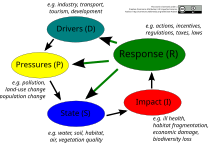DPSIR

DPSIR (drivers, pressures, state, impact and response model of intervention) is a causal framework for describing the interactions between society and the environment: Human impact on the environment and vice versa because of the interdependence of the components.
Description
This framework has been adopted by the European Environment Agency. The components of this model are:
- Driving forces: e.g. industry, tourism, economic growth
- Pressures: e.g. pollution, land-use change, population growth
- States : e.g. water quality, soil quality, air quality, habitat, vegetation
- Impacts : e.g. ill public health, habitat fragmentation, economic crisis, environmental damage, biodiversity loss
- Responses : e.g. taxes, environmental laws
This framework is an extension of the pressure-state-response model developed by OECD.[1]
As a first step, data and information on all the different elements in the DPSIR chain is collected. Then possible connections between these different aspects are postulated. Through the use of the DPSIR modelling framework, it is possible to gauge the effectiveness of responses put into place.
References
- ^ "Environmental Terminology Discovery Service (Definition of DPSIR model)". European Environment Agency. Archived from the original on 2015-07-19.
External links
